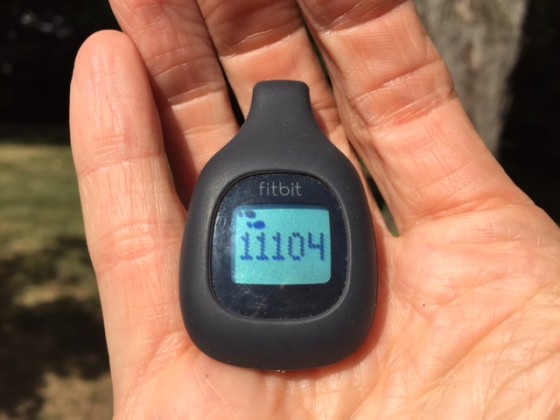
Last year, as part of our corporate wellness program, we bought Fitbits for everyone (for anyone who wanted one, the cost was a $5 donation to charity.) I wrote about it in September in my monthly newsletter and received some great feedback, so I want to share it here as well, with some updates and additional points.
I exercise regularly and have done so for many years, so I didn’t think a Fitbit would have an impact on my workout routine.
I was wrong. I find it very motivating to try to hit the 10,000-steps-a-day goal.
I’ve always enjoyed, and been motivated by, keeping track of my exercise. Going back to my earliest days as a regular exerciser (1987), I’ve kept track of how many days a week I do my cardio routine (either walking fast on a treadmill or outside, or riding my bike or stationary bike). When I added weights to my routine, I kept track of that as well.
Tom Peters, the legendary management guru, said the soundest management advice he ever heard is, “What gets measured gets done.”
I’m not writing this piece to promote Fitbits. I am writing to promote the idea that “what gets measured gets done.”
Peters also said, “Celebrate small successes…There should be at least ten celebratory acts each month, no matter how small—for example, coffee and danish for a project team that completed its work on schedule.”
While Peters writes about business management, the same kind of thing applies to personal management—and I’ve found the Fitbit helps mine by measuring my exercise and by celebrating my successes (in fact, while writing a draft of this in the “Notes” app of my iPhone, I received a notification that I met my step goal for the day. “Nailed it!,” I was told.)
(By the way, if you have an iPhone, you don’t have to buy another device to measure your exercise. The iPhone comes with a built-in app that tracks your steps—in fact, it’s been tracking your steps whether you’ve looked at the app or not. The negative is it only works if you have it with you and it’s much bigger than my Fitbit, which I carry in my pants pocket.)
While I can’t guarantee a Fitbit will change your behavior, it certainly has changed mine. I was already the kind of person who would volunteer to run up the stairs to get something my wife forgot. But I was still pleasantly surprised by the way the Fitbit has impacted me:
- I find myself making sure each week I average at least 10,000 steps a day. I often exceed it. When I exercise in the morning (which I almost always do), it’s pretty easy to hit 10,000 steps by the end of day just from normal activity. But, if for whatever reason, I see I’m not going to hit 10,000 without doing something about it, I often add more steps.
- I have been walking the hallways at work on certain calls and with others during conversations rather than sitting or standing at my (standing) desk.
- I have been walk around the conference room during meetings (in cases where that doesn’t create too much of a distraction for the others in the room).
- I have been walking across to the other side of our office to ask colleagues questions rather than calling them.
- Parking further away from building entrances now seems more appealing (which reminds me of the joke about how people will work hard when they go to the gym, and then drive around and around to get a good spot at the mall.)
- Just when I thought I had a good sense of 10,000 steps, I had some experiences where I exercised in the morning and then at the end of the day I saw hadn’t hit 10,000 steps yet. I thought, “How could I not be at 10,000 steps yet?” The only answer is I was barely moving around during the day at work, and that got me into a new 21-day focus to adopt the habit of making sure I’m getting up and moving at work, even if it means just going to the bathroom more often (which I should be doing in any event). A friend of mine told me he does something similar. He walks to a bathroom other than the one closest to his desk.
- For many years, colleagues in my office have taken mid-day walks. I’ve begun to occasionally do that. Even if it’s just a brief walk because it’s great to take a break, get some fresh air, and move.
I asked other friends at work and they used words like “accountability” and “motivation” to describe their experiences with the Fitbit.
Do you have a Fitbit or other similar device to help you track your exercise for better health? What has your experience been? Join the conversation with your comments…
Best regards,
David
